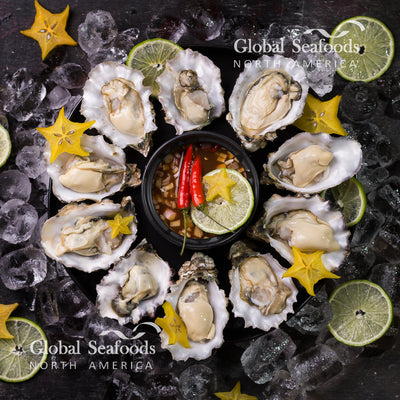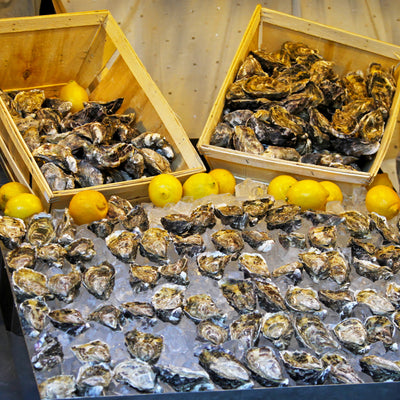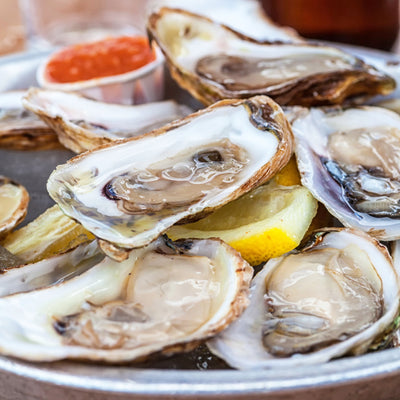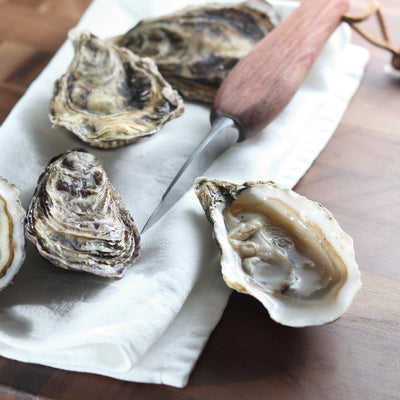The Vital Role of Oysters in the Ecosystem: How They Benefit Our Environment

Role of Oysters in the Ecosystem: How They Benefit Our Environment
Oysters, often celebrated as a seafood delicacy, are also essential to marine ecosystems and environmental health. These unassuming shellfish perform various roles, from filtering vast quantities of water to providing habitat for marine species. Their presence supports biodiversity, stabilizes shorelines, and even helps mitigate climate change. In this comprehensive guide, we’ll explore the vital role of oysters in the ecosystem, diving deep into the ways they positively impact our environment.
Learn more about oyster sustainability on our YouTube Channel.
1. Oysters as Natural Water Filters
One of the most significant ecological benefits of oysters is their ability to filter water. As filter feeders, oysters draw in water, consuming plankton and algae while trapping particles, pollutants, and sediments. A single oyster can filter up to 50 gallons of water daily, contributing to clearer, healthier waters and balancing nutrient levels in marine environments.
Environmental Science Insight: “Oysters play a crucial role in maintaining water quality, helping to prevent overgrowth of algae and sustaining healthy aquatic systems.” — Dr. Sylvia Earle, Oceanographer
Product Recommendation: For sustainably harvested options, explore Carbajal Oysters for an eco-friendly seafood choice.
2. The Impact of Oyster Reefs on Shoreline Protection
Oyster reefs serve as natural breakwaters that protect coastlines from erosion. By reducing wave energy and acting as buffers, these reefs minimize the impact of storms and prevent the loss of coastal habitats. Shoreline protection is particularly important in areas prone to hurricanes and storm surges, as oyster reefs help to absorb wave energy and protect surrounding ecosystems and communities.
Fun Fact: Oyster reefs are so effective that they are often used in restoration projects to create natural storm barriers, helping to safeguard both coastal wildlife and human communities.
Suggested Product: Try Willapa Bay Oysters, sustainably sourced from a region known for its commitment to environmental conservation.
3. Oysters and Carbon Sequestration: Fighting Climate Change
Oysters contribute to carbon sequestration by building their shells from calcium carbonate, which traps carbon dioxide. As oysters grow and build reefs, they help lock away carbon, reducing the amount of CO₂ in the water and atmosphere. This natural process aids in mitigating climate change, making oyster farming and reef restoration valuable tools in carbon reduction efforts.
Environmental Benefit: By storing carbon, oysters act as natural carbon sinks, reducing atmospheric CO₂ and promoting a balanced ecosystem.
Product Suggestion: Check out Cliff Point Petite Oysters for a high-quality oyster that supports sustainable seafood practices.
4. How Oyster Farms Promote Marine Biodiversity
Oyster reefs create habitats for various marine species, from fish to invertebrates. These reefs offer shelter, breeding grounds, and food sources, increasing biodiversity in coastal regions. Oyster beds also promote the growth of seagrass and other vegetation, which further supports marine life and improves water quality.
Biodiversity Impact: “Oyster reefs are biodiversity hotspots, attracting over 300 species to a single reef. They’re foundational to the health of marine ecosystems.” — Marine Conservation Institute
Explore Options: Miyagi Oysters are an excellent choice that supports marine biodiversity.
5. Nitrogen Reduction: How Oysters Combat Pollution
Oysters help manage nitrogen levels in water, reducing the risk of hypoxia, or low oxygen levels, which can harm marine life. Excess nitrogen from agricultural runoff can cause dead zones where fish and plants struggle to survive. By removing nitrogen compounds, oysters play a crucial role in preventing these harmful conditions, supporting a balanced ecosystem and healthier fisheries.
Environmental Insight: “Oysters act as natural nitrogen reducers, controlling pollution in water systems and promoting sustainable aquaculture.” — World Wildlife Fund (WWF)
Product Highlight: Choose Maine Oysters for sustainably harvested options that contribute to cleaner, healthier waters.
6. Oysters’ Role in Reducing Algal Blooms
Oysters’ filtration ability helps reduce harmful algal blooms that can deplete oxygen levels and release toxins into the water. By filtering out excess algae, oysters maintain water clarity and nutrient balance, creating an environment where other marine life can thrive.
Conservation Tip: Supporting oyster farms helps maintain natural water filtration systems, which is especially valuable in areas prone to algal blooms.
7. Economic and Environmental Benefits of Oyster Farming
Oyster farming is an environmentally sustainable industry that provides both economic and ecological benefits. Oyster farms require no feed or fertilizers, reducing the environmental impact commonly associated with aquaculture. They also create jobs and support coastal communities, while promoting eco-friendly seafood choices.
Economic Insight: Oyster farming is considered one of the most sustainable forms of aquaculture, as it contributes to local economies and improves water quality simultaneously.
Suggested Product: Try Tidepoint Oysters for a premium seafood option that supports sustainable aquaculture.
8. Oyster Reef Restoration Projects
Oyster reef restoration projects are gaining popularity worldwide due to their environmental benefits. These projects focus on rebuilding oyster populations and restoring reefs in areas where they have declined. Through public and private partnerships, reef restoration has successfully revitalized marine habitats, restored biodiversity, and helped protect coastlines.
Case Study: The Billion Oyster Project in New York City has restored millions of oysters to the New York Harbor, aiming to improve water quality and rebuild natural oyster habitats.
9. Threats to Oyster Populations and Ecosystems
Despite their environmental importance, oyster populations face several threats, including overharvesting, habitat destruction, pollution, and climate change. Rising water temperatures, ocean acidification, and disease also impact oyster health and survival. Conservation efforts and sustainable oyster farming are essential to protecting these vital shellfish.
Conservation Note: Consumers can make a difference by choosing oysters from sustainable farms that prioritize environmental health and habitat protection.
Explore Options: Global Seafoods’ Oyster Collection offers a variety of sustainable options that support conservation efforts.
10. How Consumers Can Support Sustainable Oyster Practices
Consumers play a critical role in supporting sustainable oyster practices by purchasing from environmentally responsible farms and choosing oysters that contribute to reef restoration projects. Look for certifications and sources that emphasize sustainable harvesting, as these choices support cleaner waters, healthier ecosystems, and thriving marine biodiversity.
Buying Tip: Sustainable seafood certifications like MSC (Marine Stewardship Council) indicate eco-friendly practices. Supporting these products helps protect our oceans.
Product Recommendation: Oysters from Global Seafoods are responsibly sourced, ensuring you enjoy high-quality seafood while supporting environmental health.
11. FAQs on the Role of Oysters in the Ecosystem
Q1: How do oysters filter water?
Oysters filter water by drawing in water and feeding on plankton, trapping pollutants and sediments within their shells.
Q2: Can oyster reefs prevent coastal erosion?
Yes, oyster reefs reduce wave energy, helping to protect shorelines from erosion and storm damage.
Q3: Are oyster farms environmentally friendly?
Yes, oyster farms require no additional feed or fertilizers, and they improve water quality by filtering pollutants.
Q4: How do oysters contribute to biodiversity?
Oyster reefs provide habitat and shelter for hundreds of marine species, supporting diverse marine ecosystems.
Q5: What can I do to support sustainable oyster practices?
Choose oysters from sustainable sources, support reef restoration projects, and educate others on the ecological benefits of oysters.
For more information and a selection of eco-friendly oysters, visit Global Seafoods’ Oyster Collection.
Conclusion
Oysters are essential to marine ecosystems and provide countless benefits to the environment, from water filtration and nitrogen reduction to shoreline protection and biodiversity support. By choosing sustainably farmed oysters, you contribute to cleaner waters and healthier marine habitats. With conservation efforts, oyster farming, and consumer awareness, oysters can continue playing their vital role in ecosystem health and sustainability.
Also in News

How to Make Sea Bream Sushi With Dry-Aged Tuna & Crab Roll — Step-by-Step With Chef Joshua
A complete guide to making Sea Bream sushi at home, including filleting, curing, slicing, and building a Dry-Aged Tuna & Crab sushi roll. Chef Joshua shares professional tips for restaurant-quality results.

Cooked Crab for Game Night: Everything You Need for a Perfect Seafood Party
Take your game night to the next level with a Cooked crab party. Learn the best recipes, cooking tips, and hosting hacks for a memorable seafood feast.

Steam Crab for Date Night: A Romantic Guide to the Perfect Seafood Feast
Make your next date night unforgettable with a romantic Steam crab experience. This guide covers everything you need to know, from ambiance to the best crab varieties.






